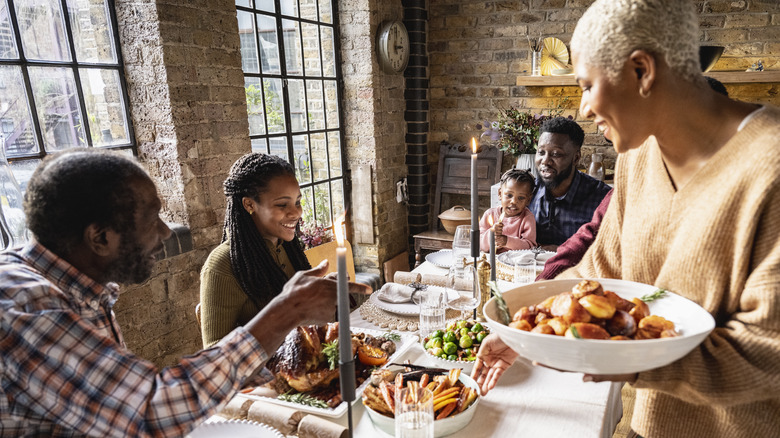Why It's Actually Bad Etiquette To Say 'Bon Appétit' At Dinner
There are numerous French words and phrases that have been incorporated into the English language, including déjà vu and bon appétit, which are commonly used in the United States. However, just because we've adopted these expressions doesn't mean they carry the same cultural meaning here as they do in France. For instance, in the U.S., saying "bon appétit" to fellow diners before a meal is common. In France, however, using the phrase in this context is considered rude.
Why is saying "bon appétit" before a meal considered bad manners in France? The phrase's reference to appetite is viewed as vulgar and in poor taste. This perspective has been prevalent in France since the 19th century, and, in fact, extends to any phrases referencing or implying bodily functions.
It's worth noting that not everyone is familiar with the intricacies of dining etiquette. Just as many people in the U.S. may not know that picking up a dropped napkin in a restaurant is frowned upon, there are those in France who are unaware of the etiquette rule discouraging the use of "bon appétit" in polite company.
Why saying 'bon appétit' is impolite in France
The phrase "bon appétit" carries more nuanced contextual meanings in French than it does in English. In the U.S., when people use the phrase before dinner, they're essentially expressing a desire for everyone present to enjoy their meal. In France, however, the situation is more complex. The word "appétit" means "appetite," and wishing fellow diners a good appetite before dinner is considered impolite for several reasons. Firstly, the phrase implies that your dinner companions are ravenously hungry, which isn't particularly flattering. Secondly, it alludes to the digestive process, suggesting that substantial digestive power will be needed for the upcoming meal. As a result, the phrase can be offensive both to the chef and to your dining partners.
If these rules seem stringent, it's worth noting that 19th-century French etiquette had some rather peculiar restrictions. For example, discussing food at the table was considered crass. Complimenting one's hosts on a successful dinner party was considered materialistic, and diners "would never touch food with their hands and would only shell shrimps with a knife and a fork," French author Frédéric Rouvillois told The New York Times.
Does this etiquette rule apply in the U.S.?
If you're planning to attend an upcoming dinner party in Paris, it's probably advisable to refrain from using the phrase "bon appétit" when the food arrives — just to be on the safe side. A simple "please enjoy," expressed in either English or French to your fellow diners, should suffice in this situation.
At a dinner party in the U.S., the dining etiquette rules are somewhat nuanced. Some people might consider the use of the phrase "bon appétit" to be pretentious. On the other hand, authorities on American etiquette, such as the late Emily Post, believed that good manners are built on three fundamental principles: consideration (will saying "bon appétit" positively affect your dining companions?), respect (does wishing them a good meal show that you value their enjoyment?), and honesty (are you sincere in your wishes?). If you can answer "yes" to all three questions, one could argue that saying "bon appétit" would be acceptable.



